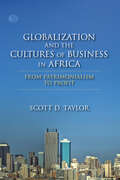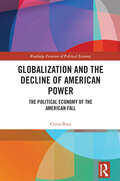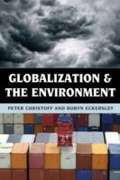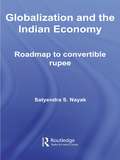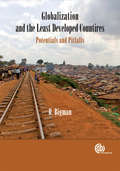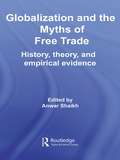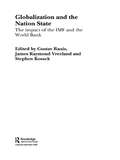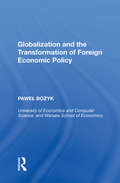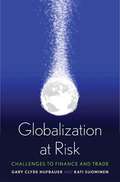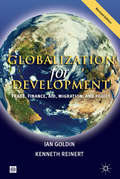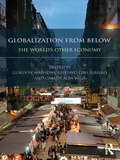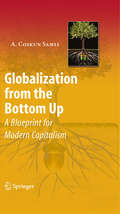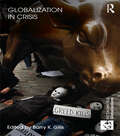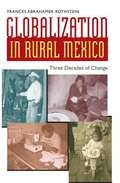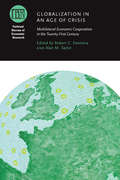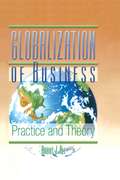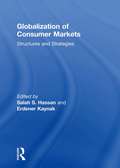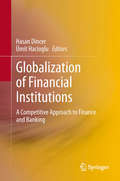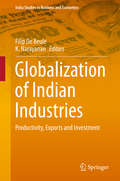- Table View
- List View
Globalization and the Cultures of Business in Africa: From Patrimonialism to Profit
by Scott D. TaylorCan Africa develop businesses beyond the extractive or agricultural sectors? What would it take for Africa to play a major role in global business? By focusing on recent changes, Scott D. Taylor demonstrates how Africa's business culture is marked by an unprecedented receptivity to private enterprise. Challenging persistent stereotypes about crony capitalism and the lack of development, Taylor reveals a long and dynamic history of business in Africa. He shows how a hospitable climate for business has been spurred by institutional change, globalization, and political and economic reform. Taylor encourages a broader understanding of the mosaic of African business and the diversity of influences and cultures that shape it.
Globalization and the Decline of American Power: The Political Economy of the American Fall (Routledge Frontiers of Political Economy)
by Cyrus BinaThis book explores America’s decline as a global power, arguing that the implosion of Pax Americana was initiated by the process of globalization, preceding the collapse of the Soviet Union by nearly a decade. The era of Pax Americana, and with it American hegemony, is conclusively passed, and will not return in current global conditions. There is a stark contrast between the present epoch and the postwar era of American hegemony (1945–1979) in which the United States, at least outside of the Soviet sphere of influence, largely managed the international economy and reigned over international politics and relations. Drawing on both theoretical and empirical evidence, this book shows that the era of globalization unleashed forces—social, political, and economic—which broke down the status quo of American hegemony. Author Cyrus Bina also establishes that since the Iranian Revolution (1979), US involvement throughout the Middle East, in Iraq, Afghanistan, Libya, Syria, Yemen, and now notably in Ukraine has been motivated by the freefall of American hegemony and an attempt to get it back by direct or indirect military force. Bina utilizes these contexts for wider analysis and critique of a number of theories commonly used to analyze economy, polity, geopolitical, and dynamics of crisis and social change in capitalism. This book will be of great interest to students, academics, and policymakers on subjects of Economics, International Relations, Global Studies, International Political Economy, Political Geography, Sociology, and postwar History.
Globalization and the Distribution of Wealth
by Arie M. KacowiczThe effects of globalization on poverty and inequality are a key issue in contemporary international politics, yet they have been neglected in international relations and comparative politics literatures. Arie M. Kacowicz explores the complex relationships between globalization and the distribution of wealth as a political problem in international relations, analyzing them through the prism of poverty and inequality. He develops a political framework (an 'intermestic model') which captures the interaction between the international and the domestic domains and explains those effects with a particular emphasis upon the state and its relations with society. He also specifies the different hypotheses about the possible links between globalization and the distribution of wealth and tests them in the context of Latin America during the years 1982–2008, with a particular focus on Argentina and the deep crisis it experienced in 2001–2.
Globalization and the Environment
by Robyn Eckersley Peter ChristoffThis book by two leading scholars offers the first systematic analysis of the relationship between globalization and the environment from the early Modern period to the present. Peter Christoff and Robyn Eckersley develop a broad conceptual framework for understanding the globalization of environmental problems and the highly uneven, often faltering, international political response. The authors develop linkages between economic globalization and environmental degradation and explore a range of key global environmental problems focusing on the two most challenging of all: climate change and biodiversity loss. Finally, they critically explore the challenges of environmental governance in a world defined by global capitalism and sovereign states. Providing a normative framework for evaluating global environmental governance, they suggest alternative institutional and policy responses. Through a rich set of case studies, this powerful book will help readers grasp the systemic causes of global environmental degradation as well as the myriad opportunities for reform of global environmental governance. "
Globalization and the Indian Economy: Roadmap to a Convertible Rupee (Routledge Studies in the Growth Economies of Asia #Vol. 80)
by Satyendra S. NayakThis book examines the impact of globalization on the Indian economy, exploring the trade, investment and financial aspects of globalization, and also considering its implications for the balance of payments and currency exchange rate. The first part of the book deals with the evolution of the philosophy of globalization and its impact on exchange rates, global liquidity, currency markets, and global trade and payments. It highlights the catalytic role played by the US in driving the globalization process, and provides detailed analysis of the evolution of the international monetary system to illustrate current processes of globalization. Furthermore, a critical discussion of the Asian financial crisis of 1997 is presented as well as the lessons that have emerged from the crisis. The Indian economic experience and its own policy of dealing with globalization is the focus of second part of the book. The author examines the genesis of economic reforms and liberalization in India. The success of the Indian policy of gradualism is discussed in the context of the Asian crisis, and the reasons as to why India averted a similar crisis are explored. Finally, the author examines whether the Indian currency, the rupee, can be made fully convertible. This book makes a valuable contribution to the literature on globalization and development and should be of interest to academics interested in the global economy, international finance, international development and also to academics with an interest in South Asian Studies.
Globalization and the Least Developed Countries: Potentials and Pitfalls
by David BigmanOne of the most notable changes in the world economy during the past three decades has been the diverging trends in the growth of the developing countries. Compared to East Asian countries that have integrated well into the global economy, those of Sub-Saharan Africa have remained stagnant and have become the world's least developed area. The policies and programs of international organizations have failed to improve the situation while the global economy becomes dominated by trans-national corporations. A review of the suitability of globalization as an economic strategy for these under-developed countries is therefore needed. Focusing on the impact of globalization and on the constraints imposed by the changes in the world's production and trade, this book examines the opportunities open to the least developed countries as they design their strategies to accelerate growth and alleviate poverty. As the world's awareness of issues concerning globalization grows, this study will provide valuable insights.
Globalization and the Myths of Free Trade: History, Theory and Empirical Evidence (Routledge Frontiers of Political Economy)
by Anwar ShaikhThe world has become a human laboratory for the momentous social experiment called neoliberalism. Its proclaimed purpose is to reduce global poverty, its protocols are derived from the orthodox theory of competitive free markets and its policies are enforced by the full weight of the rich countries and global institutions such as the World Trade Organization (WTO), the World Bank and the International Monetary Fund (IMF). This book is a critical examination of this ongoing enterprise, of its history, theory, practice, and most of all, of its outcomes. An international team of contributors has been assembled including Lance Taylor, Ha-Joon Chang and Ajit Singh.
Globalization and the Nation State: The Impact of the IMF and the World Bank (Routledge Studies in the Modern World Economy #Vol. 52)
by Gustav Ranis Stephen Kosack James VreelandThis book brings together an international team of contributors to assess the political economy of the IMF and World Bank programmes. The cutting-edge techniques of the new political economy are thus brought to bear on international issues for the first time. The book includes contributions from leading North American economists - Stephen Coate, Stephen Morris, Ravi Kanbur and Allen Drazen - as well as European-based analysts including Graham Bird and Frances Stewart.
Globalization and the Politics of Development in the Middle East
by Clement Moore Henry Robert SpringborgIn a new edition of their book on the economic development of the Middle East and North Africa, Clement Henry and Robert Springborg reflect on what has happened to the region's economy since 2001. How have the various countries in the Middle East responded to the challenges of globalization and to the rise of political Islam, and what changes, for better or for worse, have occurred? Utilizing the country categories they applied in the previous book and further elaborating the significance of the structural power of capital and Islamic finance, they demonstrate how over the past decade the monarchies (as exemplified by Jordan, Morocco, and those of the Gulf Cooperation Council) and the conditional democracies (Israel, Turkey, and Lebanon) continue to do better than the military dictatorships or "bullies" (Egypt, Tunisia, and now Iran) and "the bunker states" (Algeria, Iraq, Libya, Sudan, Syria, and Yemen).
Globalization and the Rise of Mass Education (Palgrave Studies in Economic History)
by David Mitch Gabriele CappelliThis edited collection explores the historical determinants of the rise of mass schooling and human capital accumulation based on a global, long-run perspective, focusing on a variety of countries in Europe, the Middle East, Asia, Africa and the Americas. The authors analyze the increasing importance attached to globalization as a factor in how social, institutional and economic change shapes national and regional educational trends. Although recent research in economic history has increasingly devoted more attention to global forces in shaping the institutions and fortunes of different world regions, the link and contrast between national education policies and the forces of globalization remains largely under-researched within the field. The globalization of the world economy, starting in the nineteenth century, brought about important changes that affected school policy itself, as well as the process of long-term human capital accumulation. Large migrations prompted brain drain and gain across countries, alongside rapid transformations in the sectoral composition of the economy and demand for skills. Ideas on education and schooling circulated more easily, bringing about relevant changes in public policy, while the changing political voice of winners and losers from globalization determined the path followed by public choice. Similarly, religion and the spread of missions came to play a crucial role for the rise of schooling globally.
Globalization and the Transformation of Foreign Economic Policy
by Pawel BozykThe onslaught of globalization has brought with it sweeping changes to the foreign economic policy of the last 50 years. As the international political economy of nations and regions continues to be drawn and redrawn, this book traces the goals and instruments of foreign economic policy during this period, providing insight into the long-run trends and developing new theoretical generalizations. The book charts the journey from the point when foreign economic policy was solely concerned with foreign trade - pursued to promote the interests of individual countries - to the current globalization of the world economy that creates a uniform market in goods, services and factors of production that embrace all countries and regions.
Globalization at Komatsu
by Michael Y. YoshinoThe case captures the challenges Komatsu, the second largest manufacturer of the earth moving equipment faced during the past five decades as it sought to globalize its operations. By 2007, it had become the second largest manufacturer of the earth moving equipment with more than 80% of its sales coming from outside of Japan. It has built a network of plants, distributors and service centers around the world. Senior management is convinced that a major reason for its success is its culture, recently articulated as the Komatsu Way. The central issue in the case is how to transmit and embed it to its far flung operations throughout the world.
Globalization at Risk
by Gary Clyde Hufbauer Kati SuominenHistory has declared globalization the winner of the 20th century. Globalization connected the world and created wealth unimaginable in the wake of the Second World War. But the financial crisis of 2008-09 has now placed at risk the liberal economic policies behind globalization. Engulfing the entire world, the crisis gave new fuel to the skeptics of the benefits of economic integration. Policy responses seem to favor anti-globalizers. New regulations could balkanize the global financial system, while widespread protectionist impulses might undo the Doha Round. Issues from climate change to national security may be used as convenient excuses to keep imports out, keep jobs at home, and to clamp down on global capital. Will globalization triumph or perish in the 21st century? What reforms make sense in the post-crisis world? International economists Gary Clyde Hufbauer and Kati Suominen argue that globalization has been a force of great good, one that needs to be actively advanced and honed. Drawing on the latest economic analyses, they reveal the drivers and effects of global finance and trade, lay out the key risks to globalization, and offer a practical policy roadmap for managing the challenges while increasing the gains. Vital reading for anyone in business, finance, foreign affairs, or economics,Globalization at Riskis sure to advance public debate on this defining issue of the 21st century.
Globalization for Development: Trade, Finance, Aid, Migration, and Policy
by Ian Goldin Kenneth ReinertGlobalization and its relation to poverty reduction and development is not well understood. The book identifies the ways in which globalization can overcome poverty or make it worse. The book defines the big historical trends, identifies main global flows - trade, finance, aid, migration, and ideas - and examines how each can contribute to undermine economic development. By considering what helps and what does not, the book presents policy recommendations to make globalization more effective as a vehicle for shared growth and prosperity. It will be of interest to students, researchers and anyone interested in the effects of globalization in today's economy and in international development issues.
Globalization from Below: The World's Other Economy
by Gordon Mathews Gustavo Lins Ribeiro Carlos Alba VegaThis book explores globalization as actually experienced by most of the world’s people, buying goods from street vendors brought by traders moving past borders and across continents under the radar of the law. The dimensions and practices of ‘globalization from below’ are depicted and analyzed in detail by a team of international scholars. Topics covered include the ‘New Silk Road’, African traders in China, street hawking in Calcutta and pirate CDs in Mexico. The chapters provide intimate portrayals of routes, markets and people in locations across the globe and explore theories that can help make sense of these complex and fascinating case studies. Students of globalization, economic anthropology and developing-world economics will find the book invaluable.
Globalization from the Bottom Up
by A. Coskun SamliTakes a proactive approach to addressing big issues of world poverty, economic development, and the impact of globalization -- with recommendations for business leaders, policymakers, and concerned citizens around the world Samli offers an alternative model, a philosophy and practice of "social capitalism" that is grounded in a bottom-up approach to wealth creation, while acknowledging that power will continue to be concentrated at the top level of the pyramid
Globalization in Crisis (ISSN #1)
by Barry K. GillsThis book analyses the present global financial and economic crisis, the most severe in nearly a century, and a wider set of multiple and converging crises with aspects and repercussions that go well beyond the current economic climate.Written by some of the world’s leading international scholars in the field of Globalization studies and related disciplines, this important collection addresses numerous key aspects of the relationship between Globalization and global crises, past, present, and future. It sheds new light and understanding on the concept and theory of Globalization and of ‘crisis’. The authors explore such issues as global finance and financial regulation, neoliberal ideology and policy, the ‘crisis of globalization’, the decline of Western hegemony, world systemic crisis, the moral crisis of ‘Western capitalism’, environmental and climate change crises, world order, hyper-violence and the international system, a crisis of the ‘global modern’ and a global civilisational and hostpric crisis, the rise of the global South, the historical dialectics of capital and social responses to crisis, the future of capitalism and the prospects for transformative alternatives. This book was published as a special issue of Globalizations.
Globalization in Rural Mexico: Three Decades of Change
by Frances Abrahamer RothsteinWhen the ever-intensifying global marketplace "modernizes" rural communities, who stands to gain? Can local residents most impacted by changes to their social fabric ever recover or even identify what has been lost?<P><P>Frances Abrahamer Rothstein uses thirty years of sustained anthropological fieldwork in the rural Mexican community of San Cosme Mazatecochco to showcase globalization's complexities and contradictions. <P> Rothstein's lucid work chronicles the changes in production, consumption, and social relations during three distinct periods: the Mexican "miracle," when economic development fueled mobility for a large segment of the population, including San Cosme's worker-peasants; the lost decade of the 1980s, when much of what had been gained was lost; and the recent period of trade liberalization and globalization, considered by many in Mexico and beyond as a panacea and a disaster at the same time.
Globalization in an Age of Crisis: Multilateral Economic Cooperation in the Twenty-First Century (National Bureau of Economic Research Conference Report)
by Robert C. Feenstra Alan M. TaylorAlong with its painful economic costs, the financial crisis of 2008 raised concerns over the future of international policy making. As in recessions past, new policy initiatives emerged, approaches that placed greater importance on protecting national interests than promoting international economic cooperation. Whether in fiscal or monetary policies, the control of currencies and capital flows, the regulation of finance, or the implementation of protectionist policies and barriers to trade, there has been an almost worldwide trend toward the prioritizing of national economic security. But what are the underlying economic causes of this trend, and what can economic research reveal about the possible consequences?Prompted by these questions, Robert C. Feenstra and Alan M. Taylor have brought together top researchers with policy makers and practitioners whose contributions consider the ways in which the global economic order might address the challenges of globalization that have arisen over the last two decades and that have been intensified by the recent crisis. Chapters in this volume consider the critical linkages between issues, including exchange rates, global imbalances, and financial regulation, and plumb the political and economic outcomes of past policies for what they might tell us about the future of the global economic cooperation.
Globalization in the Age of Trump
by Pankaj GhemawatBusiness leaders are scrambling to adjust to a world few imagined possible just a year ago. The myth of a borderless world has come crashing down. Traditional pillars of open markets--the United States and the UK--are wobbling, and China is positioning itself as globalization's staunchest defender. Countries throughout North America and Europe have experienced waves of anti-globalization sentiment. In the face of such uncertainty, leaders of multinationals wonder whether they should retreat, change strategy, or stay the course. In making that decision, they need to understand two things. First, the world is less globalized than even experienced executives realize. Second, history tells us that even in the face of a trade war, international trade and investment would still be too large for strategists to ignore. Today's turmoil calls not for a mass retreat from globalization but for a more subtle reworking of multinationals' strategies. This article examines common misperceptions about what is--and isn't--changing about globalization and offers guidelines to help leaders decide where and how to compete in a complex world.
Globalization of Business: Practice and Theory
by Erdener Kaynak Abbas J AliCreate a successful strategy for competition in the global marketplace!Globalization of Business: Practice and Theory will give executives and business students a current, in-depth look at ways to become globally competitive in today's complex market. This essential guide offers you insight into issues every global businessperson needs to
Globalization of CEMEX
by Pankaj Ghemawat Jamie L. MatthewsCEMEX is a Mexican company that has become a major international competitor in cement while maintaining a higher level of profitability than other, longer-established majors. CEMEX's superior profitability supplies a basis for discussing the sources of superior performance in a global context. In addition, the wide array of benefits that CEMEX derives from its operations in different countries broadens conventional notions of why firms globalize.
Globalization of Consumer Markets: Structures and Strategies
by Erdener Kaynak Salah HassanThe concepts, strategic frameworks, and cases in Globalization of Consumer Markets provide managers of global firms with new ideas for growth and keep them current with state-of-the-art global marketing strategies and management tools. With an increased understanding of the structure of today’s consumer markets, readers will find they have the key to success and survival in the global marketplace.The contributing authors present managerially oriented chapters, each of which is based on research or practical experience. These are designed to advance the reader’s knowledge of the globalizing consumer market. Focused around structure--how consumer markets on a global scale are being shaped--and strategy--successful methods necessary to global competitive marketing and how these strategies work--are the two main themes around which the book is organized.To further enable marketing professionals’success in the global marketplace, Globalization of Consumer Markets details actual strategies, action programs for competitive management, and exemplary cases. There are new ideas from expert marketers on opportunities for growth in the global marketplace and, most importantly, state-of-the-art marketing strategies and management tools. For professional marketers, this book is a must for prosperity in marketing consumer products and services on a global level.This is an ideal book for professional education in marketing of consumer products and services on a global level. Professionals will find a progression of chapters taking them through degree of globalization; market behavior and development; standardization of marketing programs and processes; managerial implications; and extensive references for further study.
Globalization of Financial Institutions
by Hasan Dincer Ümit HaciogluThis peer-reviewed volume from the Society for the Study of Business and Finance, discusses current issues in globalization and financial system from an international political and economic perspective. Contemporary instruments and actors in the global financial system are specially analyzed and the discussion of managerial and financial issues of the global financial strategies offers novelty to readers and researchers in the field.
Globalization of Indian Industries
by Filip De Beule K. NarayananThis book focuses on Indianmanufacturing industries and analyses the impact of inward foreign directinvestment on the domestic sector on the one hand, and exports and outwardforeign direct investment by Indian companies on the other. Although theemphasis is mostly general, specific industries, such as the automotiveindustry or the wind energy sector are also explored. The differences between lowand high technology industries are also addressed. In terms of theoretical settingand analysis, the book draws both from international business and industrial organizationliterature. The various characteristics of Indian industries, such as thedeterminants and impacts of R&D, the effects of spillovers, the drivers ofproductivity and technical efficiency are thoroughly researched employingappropriate quantitative methodologies that are relevant to the specific domainand topic under investigation. The book also focuses on the bearing ofpolicy on promoting manufacturing industries in India and is therefore ofinterest to researchers, industrialists and policy makers alike.
